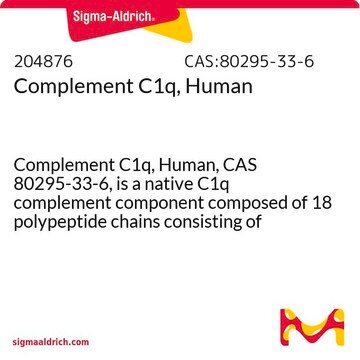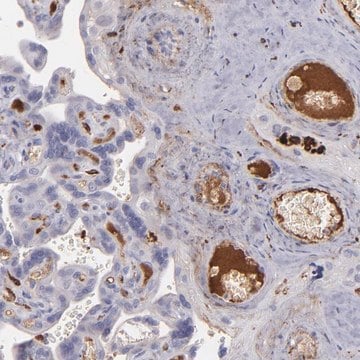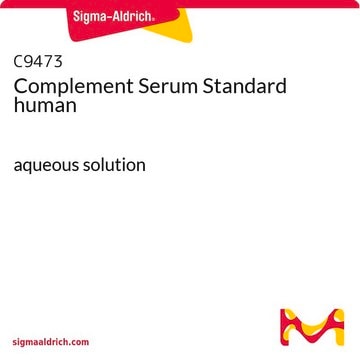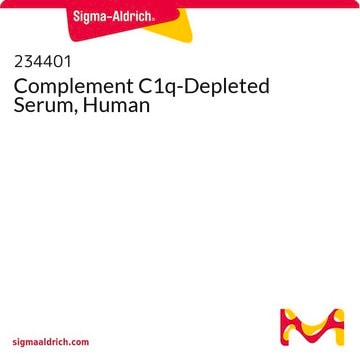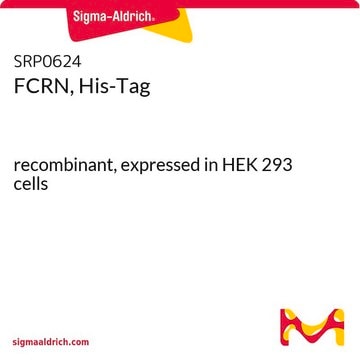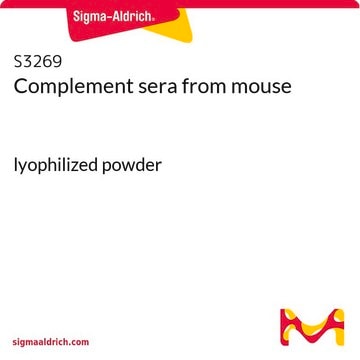C1740
Complement component C1q from human serum
≥95% (SDS-PAGE)
Sinónimos:
C1q from human serum
Iniciar sesiónpara Ver la Fijación de precios por contrato y de la organización
About This Item
Productos recomendados
biological source
human
Quality Level
assay
≥95% (SDS-PAGE)
form
liquid
technique(s)
activity assay: suitable
shipped in
dry ice
storage temp.
−70°C
¿Está buscando productos similares? Visita Guía de comparación de productos
General description
C1q, together with C1r and C1s, in the ratio of 1:2:2, form the C1 complex which is the first component of the classical complement pathway. C1q is composed of 18 polypeptide chains (six A, six B, six C) (MW 460 kDa). All contain an 81-aa collagen-like region composed of (Gly-Xaa-Yaa) repeating sequences close to the N-terminus. Three chains (A1B1C1) form a triple helix with the C-terminus forming the globular heads which may be structurally and functionally distinct domains.
Application
Complement component C1q is an important regulator factor for platelet activation. This has been a topic for research, as platelet-leukocyte aggregates play an important role in inflammatory conditions such as coronary heart disease. In particular, C1q has been shown to inhibit collagen induced aggregation and enhance production of reactive oxygen species (ROS).
Biochem/physiol Actions
C1q deficiency, either because of rare homozygous genetic defect, or transcriptional/translational defects, is almost certainly a cause of systemic lupus erythematosus (SLE). The three C1q subunits are expressed through a novel mechanism of transcriptional synchronization.
Physical form
Supplied as a solution in 10 mM HEPES, 300 mM NaCl, pH 7.2
Storage Class
10 - Combustible liquids
wgk_germany
WGK 3
flash_point_f
Not applicable
flash_point_c
Not applicable
Certificados de análisis (COA)
Busque Certificados de análisis (COA) introduciendo el número de lote del producto. Los números de lote se encuentran en la etiqueta del producto después de las palabras «Lot» o «Batch»
¿Ya tiene este producto?
Encuentre la documentación para los productos que ha comprado recientemente en la Biblioteca de documentos.
Los clientes también vieron
Christian S Lobsiger et al.
Proceedings of the National Academy of Sciences of the United States of America, 110(46), E4385-E4392 (2013-10-31)
Accumulating evidence from mice expressing ALS-causing mutations in superoxide dismutase (SOD1) has implicated pathological immune responses in motor neuron degeneration. This includes microglial activation, lymphocyte infiltration, and the induction of C1q, the initiating component of the classic complement system that
Kusumam Joseph et al.
The Journal of biological chemistry, 288(18), 12753-12765 (2013-03-16)
Uncontrolled activation of the alternative complement pathway (AP) is thought to be associated with age-related macular degeneration. Previously, we have shown that in retinal pigmented epithelial (RPE) monolayers, oxidative stress reduced complement inhibition on the cell surface, resulting in sublytic
Maria Del Pilar Martinez Viedma et al.
F1000Research, 8, 1875-1875 (2020-03-27)
Background: Global outbreaks caused by emerging or re-emerging arthropod-borne viruses (arboviruses) are becoming increasingly more common. These pathogens include the mosquito-borne viruses belonging to the Flavivirus and Alphavirus genera. These viruses often cause non-specific or asymptomatic infection, which can confound
Brian D Tait et al.
Transplantation, 95(1), 19-47 (2012-12-15)
The introduction of solid-phase immunoassay (SPI) technology for the detection and characterization of human leukocyte antigen (HLA) antibodies in transplantation while providing greater sensitivity than was obtainable by complement-dependent lymphocytotoxicity (CDC) assays has resulted in a new paradigm with respect
Anti-SARS-CoV-2 antibodies elicited by COVID-19 mRNA vaccine exhibit a unique glycosylation pattern.
Inbal Farkash et al.
Cell reports, 37(11), 110114-110114 (2021-12-10)
Messenger RNA-based vaccines against COVID-19 induce a robust anti-SARS-CoV-2 antibody response with potent viral neutralization activity. Antibody effector functions are determined by their constant region subclasses and by their glycosylation patterns, but their role in vaccine efficacy is unclear. Moreover
Nuestro equipo de científicos tiene experiencia en todas las áreas de investigación: Ciencias de la vida, Ciencia de los materiales, Síntesis química, Cromatografía, Analítica y muchas otras.
Póngase en contacto con el Servicio técnico